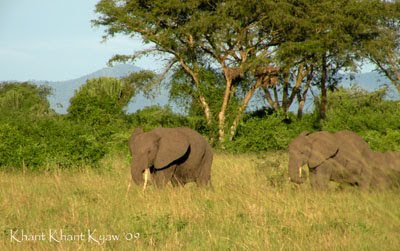I found that out the last Sunday, as I sipped a hot cup of chai. I came close to burning my tongue, from drinking the tea too quickly, a habit I have developed over time. For about 6 years in Singapore, I, like many others, have tight morning schedules. Wake up at 5.50. Toilet, brush teeth, shower. 15 minutes. Get dressed, comb hair. 5minutes. Breakfast. 10 minutes. Socks, shoes and keys. 3 minutes. Out of the house by 6.25am, in time to catch the 6.40 train to school.
But that morning, in Naivasha (a small town just an hour outside Nairobi), I just sat at the cafe, enjoying the feel of the sweet hot liquid down my throat. I was too caught up in blowing, and sipping the tea, I hadn't noticed the loud alarm of the car just outside the cafe, until my friend, Kali, who was sitting across the table pointed out. That was probably another habit acquired over the course of living in busy, noisy places.
You just block out what you don't need to see or hear. Anything that gets in the way of completing your (endless list of) tasks lined up for the day is redundunt. Ignore it, or you will be wasting time and your schedule would be messed up. Life is short, gotta do what you gotta do to live to the fullest. No time to waste. Always on the go.
That lifestyle is satisfying to me. And I think I have become too accustomed to revert it. But the trip to Naivasha has also shown me, how slowing down and enjoying simple things. If you paused and looked carefully enough, nature has many things to offer and teach us.
Kali and I had just woken up, at 5.50 again. But this time, there were no places we had to be in minutes. We strolled to the edge of slope overlooking lake Naivasha and the mountains in the great Rift Valley. We sat there, wating the sunlight slowly filling colours to the gigantic sky and the range of mountains, like an invisible paint brush colouring a canvas. (I could describe what I saw, but it could become a like a paragraph in the novels...)
I felt small and humble amidst those mountains, and thankful, for a chance to breath the air, the sounds and the sights of a beautiful morning unfold. The evening before, we had also been blessed to see the sun set. That, and several other beautiful sights.

 Sunset.
Sunset.Photo by Alex Kamweru
 Resilience. A small plant, holding on to the dry, hard rock with its fragile roots and a strong will to survive.
Resilience. A small plant, holding on to the dry, hard rock with its fragile roots and a strong will to survive.Photo by Alex Kamweru
 Alex.
Alex.The photographer and a friend, who has taught me resilience and compassion.








































